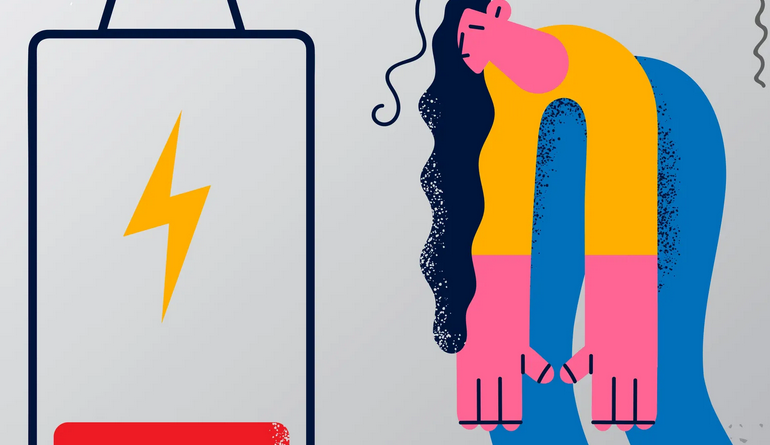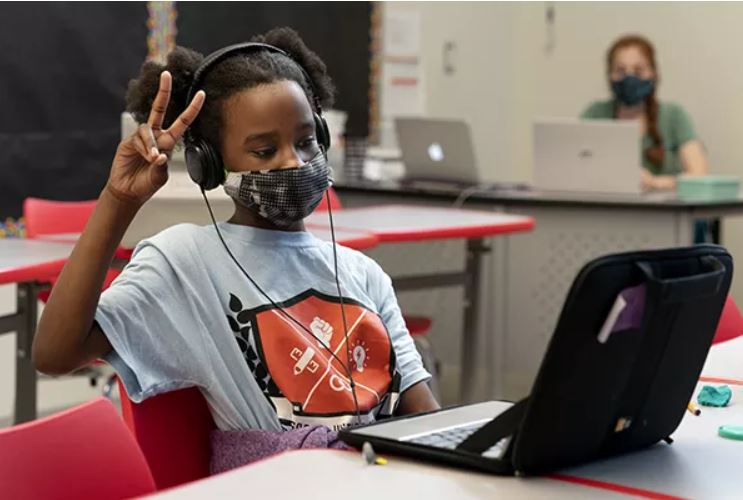How to Tell If Your Lack of Motivation Is Depression or Just…*Gestures* Everything
It can be hard to get excited about life after everything we’ve been through.
Is anyone else feeling meh lately? Call it a slump, lethargy, or a stubborn case of the blahs. It’s not sadness, per se. Or maybe it’s not primarily sadness. It’s…a general lack of motivation. Not even the motivation to accomplish a lofty goal, like picking up a new hobby or writing a novel…just the nominal amount of pep required to do everyday things. If you, like so many of us, have been feeling this way, you might wonder whether you’re merely feeling “off” or actually depressed.
The first thing to know is that you’re definitely not alone, and the events of the past few years are likely compounding this feeling. You’ve lived through a lot, with the mass-scale isolation and loss of the COVID-19 pandemic intersecting with an overdue focus on racial justice, the loss of reproductive freedom across many US states, deepening economic inequalities, an insurrection, and a daily onslaught of devastating global news, for starters. And that’s not even counting the increasingly frightening political tumult in the US that began a few years before March 2020.
“That’s a long time to deal with uncertainty,” Jelena Kecmanovic, PhD, a therapist based in Arlington, Virginia, tells SELF. “Humans don’t do well with the sense that the ground is shifting under them.” Pointing to the 2021 hot vax summer that never quite happened, followed by a string of highly contagious COVID variants, Dr. Kecmanovic adds that the false promise of a concrete end point further walloped our collective resilience. “Psychologically, it’s extremely hard when you get your hopes up and then they’re dashed,” she says. “It’s not surprising that some people may be feeling like, ‘How can I get excited about anything, because there’s always something around the corner?’”
We’ve only begun to process everything that’s happening, says Erin Matthews, LCSW, a therapist based in Chicago who’s had many clients tell her that they’re struggling to motivate themselves. “The fatigue is real,” Matthews tells SELF. Unfortunately, US culture prioritizes productivity over taking the time to mourn and heal, she says. The overarching sentiment, she says, is, “‘Well, hurry up and get done with that. You need to go back to work.’ But your body is truly exhausted, and your mind hasn’t rested in two years.”
Dr. Kecmanovic and Matthews agree that it’s possible to feel unmotivated without being clinically depressed, though there is an overlap in symptoms. The signs of depression that therapists screen for, Dr. Kecmanovic explains, include changes in appetite, sleep and energy, ability to focus, and sex drive, plus a sadness that’s present more often than not. “More serious symptoms include a sense of worthlessness, an exaggerated sense of guilt, and suicidal ideation,” she adds.
One symptom that both unmotivated and outright depressed people share presents as something called anhedonia, or the inability to feel pleasure. The other is fatigue. Matthews says that many of her clients still aren’t pursuing the activities they used to do for fun pre-pandemic. But she says the majority can at least motivate themselves to shower, do their hair, and go to the gym—even if they’re not psyched about it ahead of time. As a therapist, Matthews gets concerned when clients still feel nothing afterward or when they can never bring themselves to get going at all.
“After a month or so, if we’ve brainstormed at least one thing they need to get back to doing and there’s still no motivation or change in their mood, that’s when I’m saying, ‘This can’t continue,’” Matthews says. At that point, she suggests exploring further treatment, such as medication. It’s also worth reaching out to a doctor for a general health screening to see if the way you’re feeling could be attributed to another health problem that’s potentially making you feel sluggish (like long COVID, if you’ve had the virus in the past).
Given that therapy or even a routine physical isn’t financially feasible for everyone, is it possible to self-assess whether you have depression? “It is, but you have to be honest,” Matthews says, adding that this can be extremely difficult when seeing the world through the thick veil of said depression. It may take an outside party, even if it’s a loved one, to help you realize you haven’t been acting like yourself in more ways than “I just don’t feel like playing tennis anymore.”
Either way, both experts recommend getting proactive over assuming it’ll pass on its own.
This isn’t to suggest that you can gratitude-journal your way out of systemic dysfunction, as solely individualistic solutions won’t lift us out of this languor alone. “The culture hasn’t rebounded yet; institutions haven’t rebounded yet,” Bernice A. Pescosolido, Ph.D., a sociologist who has studied COVID-19’s mental health impact, tells SELF. “Right now, people are asking what the new norm is.”
All of that said, life is happening to all of us right this minute. You have the right to all the enthusiasm and joy it offers, and there are ways to rediscover it. Here’s what experts suggest trying when you don’t think you’re depressed but want to get that bounce back in your step.
Research has shown that a lack of connection harms your mental and physical health. Even if it feels like your social interaction muscles aren’t what they used to be, “We have to rebuild it—and we have the capacity to,” Dr. Kecmanovic says.
On that note, make a point to open up to at least one person you trust about how you’ve been feeling—and don’t wait until things feel dire. Matthews says not everyone is aware that they’re on the path toward a more serious mental health struggle. “Many times when people are depressed, they don’t even know that they’re running on empty.” When you have this conversation, try to be as honest as possible. That might look like letting your friend or loved one know you’ve just been feeling a bit low and asking for their support in a way that feels really meaningful to you right now.
You know in your heart of hearts that room scrolling never helps. “Global issues are weighing heavily on people,” Matthews says. “The hope starts to erode.” If you can’t unplug completely, try to limit your exposure to your news feed, at least. Consider tweaking how you spend time on social media, reallocating that time to taking action in your community or volunteering around a cause that’s important to you, connecting you to like-minded people—and helping others will likely boost your levels of hope and well-being too.
“I’ve seen many of my clients leave their job or switch jobs, and in a week or two, they’re back to their normal self,” Matthews says. Of course, this isn’t always an option for a lot of people, but this may be an opportunity to reevaluate other things—relationships and time commitments—that are draining your energy reserves. It’s really about considering whether something in your life is truly making you miserable that you can let go of or walk away from.
As unappealing as it may sound, doing an activity that you usually find meaningful or pleasurable, even when you don’t want to—and continuing to do it consistently—is the idea behind behavioral activation, a cognitive behavioral therapy (CBT) skill that aims to improve mood through behavior.
“Ask yourself, ‘What’s the smallest step I can take today in the direction of what matters to me?” Dr. Kecmanovic says. You may feel an urge to avoid the activity bubbling up; do it anyway. “Trust the process, and do it again and again.” For example, if you used to love running but can’t face your usual route or put in that much effort, just wear your sneakers and go for a walk.
Change doesn’t happen overnight, and your lack of motivation is valid—so be gentle with yourself. If you’re on that first jog in months, let yourself feel all of the emotions that come with that. “Even if you don’t enjoy it—and you probably won’t—bring a lot of self-compassion and kindness,” Dr. Kecmanovic says. “As well as forgiveness to that experience of ‘this used to feel a little better.’”
Of course, if you feel that the slump you’re in is more serious and feels more like depression than a passing case of the blahs, you should reach out to a therapist. But if you’re feeling the lack of motivation we talked about here, know that with time, action, and patience, Dr. Kecmanovic believes most people can get their motivation back. “We can’t forget—and sometimes we do forget in my field—that people are fundamentally resilient, even if they go through traumatic events.”
Source: https://www.self.com/story/lack-of-motivation-depression?utm_medium=10today.uk.rd.20220902&utm_source=email&utm_content=article&utm_campaign=10fortoday4.0styling




